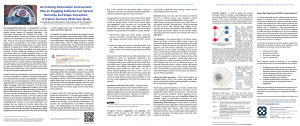How an Engaging Audience Can Spread Narrative and Shape Perception.
A Trident Juncture 2018 Case Study
Throughout Trident Juncture 2018, the Collaboratorium for Social Media and Online Behavioral Studies (COSMOS) identified key information actors and their tactics in the YouTube information environment. YouTube channels are able to interact with their audience in the comment section which can be used and abused to spread messages and disinformation. This study focuses specifically on YouTube comments posted around the 2018 Trident Juncture exercise and identifies how commenters propel video’s popularity while potentially shaping human behavior through perception. YouTube is the most popular social media site for video sharing. With that, YouTube channels influence human network behavior by shaping perceptions; simultaneously, commenters on these channels boost search engine results which promulgates higher returns on search engines.
Download the NICC 2019 Trident Juncture summary report here:
Please email Dr. Agarwal to receive an in-depth analysis of comments and commenters on YouTube channels covering Trident Juncture 2018. This research reveals effective communication strategies that are often overlooked but highly effective to gain tempo and increase legitimacy in the overall information environment. This research was conducted to illuminate the often forgotten networks within the YouTube ecosystem.
About the Authors:
Rick Galeano is an active duty US Army officer assigned to the Commander’s Initiative Group at USARCENT. He has earned the rank of Eagle Scout and excelled through the ranks of the US Army, currently achieving the rank of Lieutenant Colonel. Rick is a PhD Fellow at the University of Arkansas at Little Rock pursuing a degree in Computers and Information Science. He has authored or co-authored multiple publications revolving around strategic communications, social network analysis, and social cyber forensics and has recently become a member of the Social Cyber Security Working Group.
Katrin Galeano is a PhD Fellow working as a researcher for the Collaboratorium for Social Media and Online Behavioral Studies (COSMOS) at the University of Arkansas at Little Rock. She majors in Computers and Information Science. Katrin graduated Summa Cum Laude with her bachelor’s in Mass Communications and Business Administration and maintained academic excellence for her graduate degree. She was recognized as the lead communicator in broadcast radio during her early years, revolutionizing an analog to digital transformation as an undergraduate. She has numerous publications focused on the information domain. Her active research ties in to disinformation and the implications of narrative change via online media platforms.
Dr. Nitin Agarwal (nxagarwal@ualr.edu), is the Jerry L. Maulden-Entergy Endowed Chair and Distinguished Professor of Information Science at the University of Arkansas and founding director of the Collaboratorium for Social Media and Online Behavioral Studies (COSMOS). He researches cyber information campaigns, information/influence operations, deviant behavior modeling, social-cyber forensics, group dynamics, social computing, data mining, adversarial AI, health informatics, and privacy. His research is supported by the US Department of Defense, DARPA, Department of State, Department of Homeland Security, National Science Foundation, and works closely with the NATO Strategic Communications Center of Excellence and United States’ policy makers both national and state-level. He is a fellow of the Arkansas Research Alliance and Arkansas Academy of Computing.

